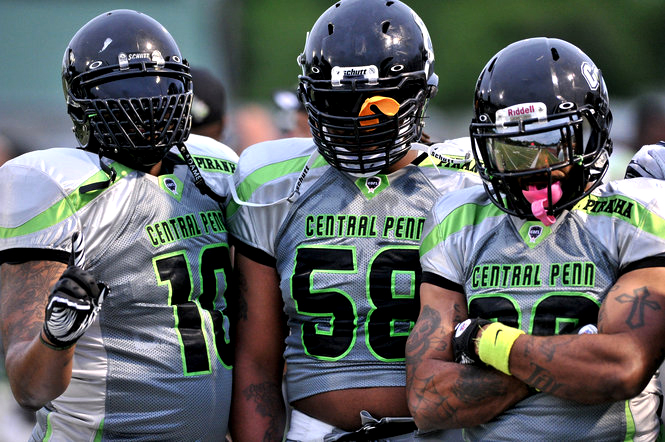
The Central Penn Piranha were a semipro football powerhouse before the team folded in the spring of 2015.
This story originally appeared in Harrisburg Magazine back in 2002.
By CHRIS A. COUROGEN
There’s lots of things to do on a hot summer Saturday night in Harrisburg. Chances are, you were to make a list, “watch a football game” probably would not make your top ten. So it’s a little surprising when to pull into the parking lot on City Island about an hour and a half before the kickoff of a mid-July game between the Central Penn Piranha and the East Penn Scorpions and find a beehive of activity.
Already the lot on the stadium side of the island is close to full, and people are hustling across the Walnut Street Bridge. Could it really mean a big crowd will be on hand for what is being billed as Woody’s Workout Bowl III?
Actually, no. The Piranha might be the defending national champion of what is referred to as minor league football and ranked number one again this season. But the majority of the folks on City Island hardly seem to notice. They’re here for picnics. Or miniature golf. Or train rides. They’re here to roller blade or just to take a walk. Most are oblivious to the close to 100 grown men in football pads, loosening up on the field of the Skyline Sports Complex.
Welcome to the NAFL; The North American Football League. It might share three letters with the NFL, but that “A” might as well stand for “A World”, as in “A World of Difference.”
Folks associated with the league like to call it professional football. It’s not. Professional players get paid. These guys pay their own way. They even have to pay for their own jerseys, though they do get the money refunded if they turn them in at the end of the season.
Down in Philly, they are about to open a brand-new stadium, replacing run-down Veterans Stadium, which had a reputation as the biggest dump in the NFL. Compared to City Island’s Skyline Sports Complex, the place the Piranha calls home, the Vet is a palace.
On one side of the field there are a few sets of aluminum bleachers. On the other, fans have claimed a small hillside, setting up their folding chairs for the City Island equivalent of skyboxes. The PA system is a couple of portable speakers set up beside the canvas cabanas with folding tables that serve as the press box. The concession stand is a catering wagon. The locker rooms are a couple of trailers that used to serve as the clubhouses for Riverside Stadium before the Senators got permanent digs. They are so small that at halftime, the Piranha opts to lounge at the picnic area beside the beach volleyball courts at the north end of the field. The Scorpions settle for the grassy hillside under the scoreboard at the other end.
Get there early and you can watch the players arrive, many of them already clad in their game pants, carrying their shoulder pads and helmets under their arms as they walk in from the same far-from-the-field parking lot the fans use. There’s no players’ parking lot next to the stadium. No team bus either. Most drive to the game in their own cars, bringing along their wives or girlfriends, others carpool with a couple of teammates. No autograph seekers bother them as to walk to the stadium. Nobody even seems to notice them as they walk by.
At one end of the field is the dirt cutout of a softball infield. At the other, the goalpost uprights lean like an Italian tower. Even before the game gets underway, it is clear that the distance between here and the NFL is a lot further than the 90 miles of turnpike that leads to Philadelphia.
They call this minor league football, but this is not minor league in the sense that most people think of minor league sports. These teams are not part of any feeder system for the big leagues, the way the Senators, for example, develop players for the Montreal Expos. In football, that role is reserved primarily for the college ball. Sure there are exceptions, like former Pro Bowler Eric Swann, who the Arizona Cardinals discovered playing for the Bay State Titans, but dream though they will, don’t expect any of these guys to give up their day jobs. A few have gone from the NAFL to play Arena ball, or the European Federation of American Football (not to be confused with NFL Europe, which actually is like a farm system for the NFL). For most of these players, though, this is as good as it is going to get.
The veterans understand that and accept it.
“There’s no market in the NFL for 36-year-old rookie quarterbacks,” says Piranha quarterback Tom Porr, the Steel-High grad who is quite possibly the best minor league QB in the nation.
“The younger guys, they’re still hoping. I don’t blame them. I was in their shoes one time” says Porr’s brother Mike, an offensive lineman with the Piranha. Reality set in for Mike Porr a couple of years ago when he thought he had an invitation to try out as a long-snapper with the Eagles, only to be turned away at the training camp gates by a coach who kindly explained that he was too old, and too slow, to even get a chance to show what he could do.
That would have been enough to convince a lot of guys to hang it up. Not Mike Porr. At the old-for-football age of 32, he is still out here, driving truck all week and banging heads with guys 10-years his junior on Saturday nights. Mike has been playing minor league football for 13 seasons, beginning his career with the old Harrisburg Patriots.
Porr was in the starting lineup when the Piranha played its first game in the summer of 1995. Back then, the players got paid, some of them pocketing $100 a game. Financial reality sat in in a hurry.
“We haven’t gotten paid for eight years,” says Mike Porr.
So why do they keep playing.
“It sure isn’t for the money,” Mike Porr says with a laugh. “It’s the love of football.”
“And the winning,” adds Tom Porr. “I love to win.”
Win they do. The Piranha calls itself the “winningest team in minor league football history.” Nobody is sure how authoritative that claim might be. There’s been an awful lot of semi-pro football played over the years and the record keeping has not always been dependable. Then again, the odds would seem stacked against anybody claiming a more successful franchise. Through the 2002 season the Fish have won 116 of the 122 games they played, claiming four league titles and last season’s national championship in the process. After opening this season with a pair of wins, both at home, the Piranha were an incredible 79-0 all-time on City Island.
That’s pretty impressive at any level.
The Piranha’s record tells you a little about the type of ballplayers that fill their roster. Three of the Piranha have spent time in NFL training camps and a handful come with major college pedigree. The Pennsylvania State Athletic Conference, one of the nation’s top Division II leagues, is well represented, with the balance of the roster made up mostly of guys who played Division I-AA ball.
The difference between those leagues and the ones you see every Saturday on TV can be measured in very small increments; an inch of height here, 10 or 15 pounds there or a tenth-of-a-second or two in the 40-yard dash. For many of these guys, those are the same small measures that explain why they are here on City Island on a July Saturday night instead of off getting ready to report to an NFL training camp.
There are also a number of players who, for whatever reason, never played college ball. Mike and Tom Porr both fall into that category. Tom Porr actually spent about a week in preseason drills at Millersville before deciding college was not for him and enlisting in the Army, where he became a good enough volleyball player to make the All-Armed Forces team and earned a volleyball scholarship to Rutgers. Mike Porr might have had a chance to play big-time college ball, if only he’d paid more attention to his studies. Penn State and Michigan both gave the Steel-High star a look before shying away because of his grades.
In other words, they might not have NFL pedigree, but they are pretty damned good athletes who play pretty damned good football. Watching them methodically take apart their opponents from the Philly area, you can’t help but wonder how good they might be if they practiced more than once a week.
“I believe you could take the Piranha team, and if we could train every day, if that was our lifestyle, we could play with NFL teams, or at least the Canadian League,” says Mike Porr. “The NFL Europe, Arena Football – we’d kill everybody.”
Mike told me that over the phone, so I have no idea if he was drinking at the time. But can you blame these guys for dreaming, or for wanting to face some tougher competition. Last season they outscored the opposition by an average of 40-6, posting eight shutouts en route to the national title.
“Some fans might be turned off by how badly we beat teams,” says Tom Porr, pondering the small crowds that come out to watch them play. “They want to see more competitive football.”
Tickets are cheap. Great seats are plentiful. There’s next to no line at the beer cart. What’s not to like. The Piranha calls their home field the Fish Tank, but the crowd could fit in a fish bowl. On this mid-July evening, it brings to mind Yogi Berra’s classic line, “If people don’t want to come out to the ballpark, nobody’s going to stop them.”
There’s no official attendance announced. No need to. Anybody who really wants to know could count the fans themselves. It’s not quite as quiet as a church, but during lulls in the action, it is quiet enough to hear every F-bomb dropped on the opposite sideline.
That is too bad, too. No, it is not the NFL. But it is good football and until Mayor Reed’s Polytechnic University starts fielding a team, it’s the only game in town

